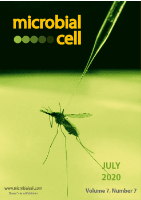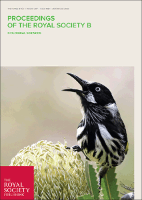
PLOS BIOLOGY
metrics 2024
Exploring the Frontiers of Life Sciences Together
Introduction
PLOS BIOLOGY, published by PUBLIC LIBRARY SCIENCE, is a leading open-access journal that has been at the forefront of biological research since its inception in 2003. This high-impact journal (with an impressive Scopus ranking placing it in the top 10% across multiple biological disciplines) aims to disseminate groundbreaking research findings in a variety of fields, including Biochemistry, Genetics, Molecular Biology, Immunology, Microbiology, and Neuroscience. With a commitment to open-access principles, PLOS BIOLOGY ensures that its content is freely available to a global audience, fostering collaboration and innovation among researchers, professionals, and students worldwide. Its Q1 quartile status in 2023 highlights the journal's prestigious standing within the academic community, making it an essential resource for those seeking to stay updated with the latest advancements in biological sciences. The journal's scope extends from 2003 to 2024, reflecting its sustained relevance and impact in driving forward biological discoveries.
Metrics 2024
 3.82
3.82 7.80
7.80 8.20
8.20 305
305Metrics History
Rank 2024
Scopus
IF (Web Of Science)
JCI (Web Of Science)
Quartile History
Similar Journals

Communications Biology
Empowering Global Collaboration in Biological SciencesCommunications Biology, published by NATURE PORTFOLIO, is a premier open-access journal that has been at the forefront of biological sciences since its inception in 2018. With a remarkable impact factor and a strong reputation in the field, it has achieved prestigious Q1 rankings in Agricultural and Biological Sciences, Biochemistry, Genetics and Molecular Biology, and Medicine, highlighting its significance in disseminating cutting-edge research. The journal is renowned for its focus on innovative, interdisciplinary biological studies, making it an essential platform for researchers, professionals, and students alike, eager to contribute to and engage with the latest discoveries. With its commitment to accessibility, all articles published are openly available to the global research community, furthering the collaboration and advancement of knowledge in the biological sciences. For more information, access options, and submission guidelines, please visit the journal's website.

Emerging Topics in Life Sciences
Illuminating Trends in Life SciencesEmerging Topics in Life Sciences is a prestigious journal published by Portland Press Ltd, dedicated to advancing the field of life sciences through innovative research, critical reviews, and insightful discussions. With an ISSN of 2397-8554 and an E-ISSN of 2397-8562, this journal operates from its base in the United Kingdom and has quickly established itself as a leading platform for high-quality scientific communication since its inception in 2017. Its esteemed ranking in the 2023 Scopus Quartiles—notably Q1 in Agricultural and Biological Sciences and Q2 in Biochemistry, Genetics and Molecular Biology—demonstrates its significant impact, attracting the attention of researchers and practitioners alike. The journal excels in providing open access to its content, ensuring that vital information is freely available to the global research community. With a focus on the latest trends and emerging topics, this journal is ideally suited for academics, professionals, and students seeking to deepen their understanding of life sciences and contribute to this dynamic field.

Cells
Pioneering Discoveries in Biochemistry and GeneticsCells, published by MDPI in Switzerland, is a leading open-access journal that has been disseminating groundbreaking research in the fields of Biochemistry, Genetics, and Molecular Biology since its inception in 2011. With an impressive E-ISSN of 2073-4409, the journal boasts a strong impact factor and ranks in the 84th percentile for Scopus ratings, underscoring its significance in advancing scientific knowledge. As a Q1-ranked journal in both 2023 and 2020, it serves as a premier platform for researchers, professionals, and students eager to explore innovative findings and methodologies. By providing unrestricted access to high-quality research, Cells plays a pivotal role in facilitating collaboration and inspiration within the global scientific community, making it an indispensable resource for anyone interested in cutting-edge discoveries in cellular biology.

MICROBIOLOGY AND MOLECULAR BIOLOGY REVIEWS
Exploring the Intricacies of Life at the Microbial LevelMICROBIOLOGY AND MOLECULAR BIOLOGY REVIEWS, published by the American Society for Microbiology, is a premier journal dedicated to advancing the fields of microbiology and molecular biology. With an impressive impact factor reflective of its Q1 ranking in categories such as Immunology, Infectious Diseases, and Molecular Biology, this journal consistently showcases high-quality, peer-reviewed articles that contribute to the current understanding of microbial life and molecular mechanisms. Operating since 1997, the journal aims to bridge the gap between microbiological methods and molecular biology applications, making it an essential resource for researchers, professionals, and students alike. Readers can access content through various platforms, ensuring that the latest findings are readily available to the scientific community. With its esteemed reputation, MICROBIOLOGY AND MOLECULAR BIOLOGY REVIEWS remains a leading voice in the exploration of the life sciences, catering to a broad audience deeply invested in unraveling the complexities of microbial and molecular systems.

Microbial Cell
Advancing the frontiers of microbial science.Microbial Cell is a distinguished open-access journal published by SHARED SCIENCE PUBLISHERS OG, focusing on the dynamic fields of microbiology, biochemistry, and molecular biology. Since its establishment in 2014, Microbial Cell has been at the forefront of disseminating cutting-edge research essential for advancing our understanding of microbial functions and interactions. With a commendable impact factor and ranking in the top quartiles (Q1 and Q2) across several categories, including Applied Microbiology and Biotechnology and Parasitology, this journal serves as an invaluable resource for researchers, professionals, and students alike. It features a comprehensive scope that encompasses the latest findings in genetics, cell biology, and virology, facilitating the academic community's access to high-quality peer-reviewed work. Microbial Cell not only contributes to advancing microbial sciences but also fosters an inclusive platform for knowledge sharing and collaboration in the scientific community.

BMC BIOLOGY
Fostering Collaboration in the Life Sciences Community.BMC Biology, a prominent open access journal published by BMC since 2003, offers a dynamic platform for the dissemination of research in the fields of biology, biochemistry, and biotechnology. Based in the United Kingdom, this journal showcases high-impact studies that cover a broad range of topics including cell biology, developmental biology, ecology, and structural biology, reflecting its commitment to advancing knowledge in the life sciences. With an impressive record of Q1 rankings across multiple categories in 2023, including Agricultural and Biological Sciences and Biochemistry, Genetics and Molecular Biology, BMC Biology stands out as a leader in these disciplines. Researchers will find a robust forum for innovative and high-quality research due to its substantial Scopus rankings, which place it within the top 10% of its field. The journal's open access policy facilitates widespread dissemination, ensuring that critical biological research is accessible to a diverse global audience. Whether you are a researcher, student, or professional in the biological sciences, BMC Biology is essential for staying informed about the latest advancements and developments in this ever-evolving field.

Life Science Alliance
Catalyzing Breakthroughs in Molecular Biology and Health.Life Science Alliance, published by LIFE SCIENCE ALLIANCE LLC, is a premier open access journal that has been making significant contributions to the fields of Biochemistry, Genetics and Molecular Biology, Ecology, Health, Toxicology and Mutagenesis, and Plant Science since its inception in 2018. With an impressive ranking in Scopus, including Q1 quartile positions and high percentiles in relevant categories, this journal is a vital resource for researchers, professionals, and students alike who seek to advance knowledge and innovation in life sciences. The journal operates on an open access model, ensuring that research findings are freely available to the global scientific community, thereby enhancing the visibility and impact of published work. With a commitment to fostering collaboration and disseminating high-quality research, Life Science Alliance serves as an essential platform for the promotion and exchange of scientific knowledge, aiming to bridge gaps and stimulate discussions across multiple disciplines.

Bio-protocol
Pioneering protocols for the next generation of researchers.Bio-protocol is an innovative open-access journal dedicated to the advanced fields of biochemistry, immunology, neuroscience, and plant science, published by BIO-PROTOCOL in the United States since 2023. With an E-ISSN of 2331-8325, this journal serves as a pivotal platform for sharing high-quality methodologies and experimental protocols, enabling researchers, professionals, and students to streamline their experimental workflows and enhance reproducibility in scientific research. In 2023, Bio-protocol achieved notable rankings, placing in the Q2 category for biochemistry, genetics, molecular biology, and immunology, as well as Q3 in neuroscience, reflecting its growing influence and relevance in these fields. The journal offers full open access, ensuring that cutting-edge research is freely available, promoting global collaboration and innovation in the life sciences. Engaging with Bio-protocol positions its readers at the forefront of significant scientific advancements and methodological developments.

PROCEEDINGS OF THE ROYAL SOCIETY B-BIOLOGICAL SCIENCES
Bridging Disciplines for Scientific ExcellencePROCEEDINGS OF THE ROYAL SOCIETY B-BIOLOGICAL SCIENCES, published by the esteemed Royal Society, stands as a premier platform for disseminating cutting-edge research in the fields of Biological Sciences. With an impressive impact factor reflective of its high citation rates and scholarly contributions, this journal encompasses a wide array of disciplines, including Agricultural and Biological Sciences, Biochemistry, Genetics and Molecular Biology, Environmental Science, and Immunology and Microbiology, consistently ranking in the Q1 category across these fields. Since its inception in 1946, it has been committed to advancing our understanding of biological systems and informing evidence-based practices. Researchers and academics can submit their work without the Open Access barrier, thereby maintaining the integrity of the disciplinary discourse while providing comprehensive insights. The journal's location in the United Kingdom also positions it at the heart of global scientific innovation, making it a vital resource for professionals and students alike who are eager to explore the latest trends and breakthroughs in the biological sciences.

Annual Review of Genetics
Exploring the Depths of Genetic Discovery.The Annual Review of Genetics is a premier academic journal dedicated to advancing the field of genetics through critical, comprehensive reviews that synthesize current research and highlight future directions. Published by Annual Reviews, this esteemed journal boasts an impressive impact factor, ranking in the Q1 category for Genetics, and holds a distinguished position as 14th out of 347 journals in the Scopus ranking for Genetics, placing it in the 96th percentile among its peers. With its convergence of knowledge from 1970 to 2023, the journal serves as an essential resource for researchers, professionals, and students alike, facilitating a deeper understanding of genetic principles and their applications. Although the journal is not open access, it remains a vital platform for disseminating high-quality, peer-reviewed content that shapes the conversation in genetics, making it a must-read for those seeking to stay at the forefront of this dynamic field.